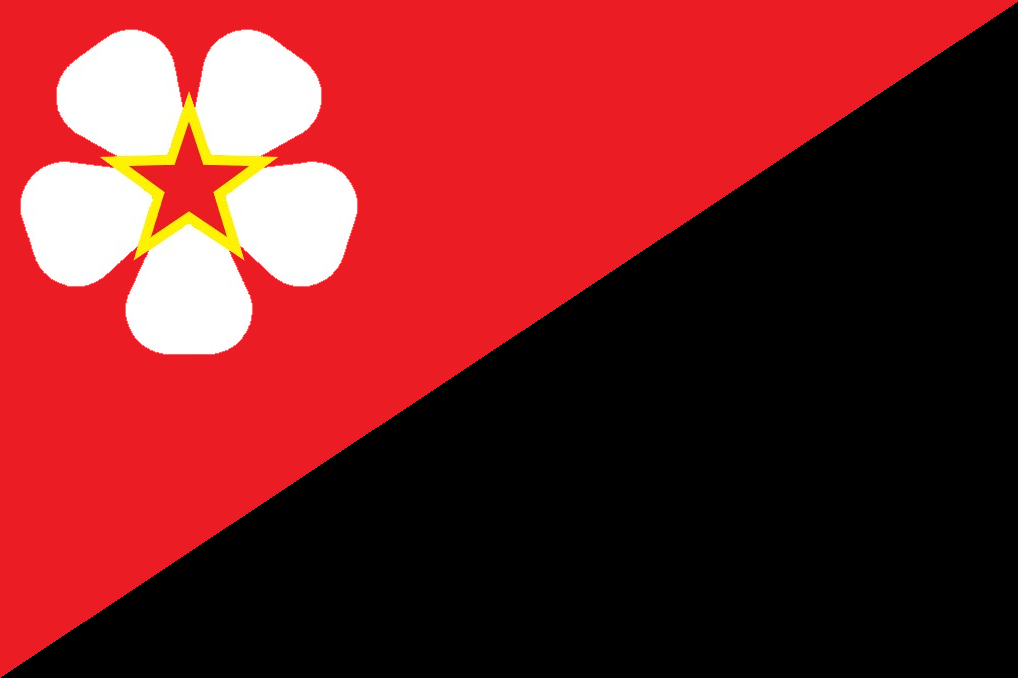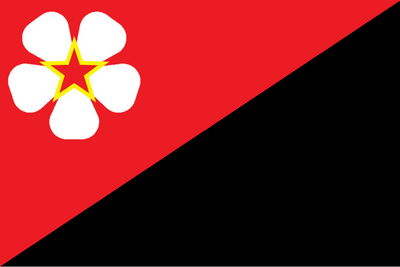Klensagrad Commune
|
Anarcho-Syndicalist republic of Sahrland
Kommun Klensagradina
|
|||||
|---|---|---|---|---|---|
 |
|||||
| Motto | "Feed those who deserve feeding, Destroy those who deserve destroying" | ||||
| Common Name | Klensagrad Commune | ||||
| Anthem | "Mother anarchy loves her sons" | ||||
| File:Klensagradcommuneglobe.png | |||||
| Demonym | Klensagradite/Communard | ||||
| Official languages | Aontan | ||||
| Currency | Rút | ||||
| Politics | |||||
| Capital | Klensagrad | ||||
| Government | Syndicalism | ||||
| Foundation | 2145 | ||||
| Preceded by | Sahr | ||||
| Followed by | Sahr | ||||
| Demography | |||||
| Ethnicities | Egerce | ||||
| Population | 190,000~ | ||||
| Area | 68 km² km² | ||||
Not to be confused with Klensagrad (Citystate).
The Klensagrad Commune was a short lived city state on the Klens peninsula from 2145 to 2146 which bordered Republican Sahrland. It's entire existance was during the Sahren Civil War. It advocated for a system of governance in which a state was a loose federation of smaller communes led by workers unions.
| “ | I have the most evil memories of Klensagrad, but I have the most fond memories of Klensagradites | ” |
| —Rory-kæ Abzalev, Withering of a Cynaz. | ||
Etymology
Klensagrad Commune (Kommun Klensagradina) is a nickname for the state referring specifically to the administrative borders of Klensagrad, which was the capital city and main population centre. After their separation from Kralnovist Sahrland the state officially was named "Anarcist-Shiondacach Respublika Sahrlandiya" directly translating as "Anarcho-Syndicalist republic of Sahrland". Syndicalism itself was a rarely used word, but worked as a way to distance themselves from the hardliner Kralnovist movements.
Politics
Government
In theory the government of the Klensagrad commune was run by a council of workers. Issues were debated on by the council until a majority decision could be made. The council would appoint state positions in the same way. In practice however the commune was essentially a proletarian dictatorship under Duaren Yague, as he was in overall command of the armed forces which had supreme authority to redistribute wealth as defined by the war communism laws.
Foreign Relations
The Klensagrad commune was recognized by no other countries. It was condemned on the international stage by powers like Zokesia, Orion, Phoenia, and many others. Contemporary nations of adjascent ideology like Nova Kalbanija and Arcadia saw them as too unstable to support, instead prefering the Kralnovists.
Military
All military assets of the Klensagrad Commune were part of the Klensagradite People's liberation front (Klensagradina Narodina Saoirse Tosaigh or KNST) which answered directly to Duaren Yague. Initially individual units were led by soldier's councils, but these were swiftly dealt away with upon the war's start in favour of a traditional structure.
Economy
War communism laws under the labour party government were carried over which effectively made the army into an all powerful organization. A policy of wealth redistribution was carried out causing the deaths of many entrepeneurs and the seizure or plundering of their businesses.
Food shortages
The economy of Klensagrad was mostly based on manufacturing. The city relied on the outer suburbs to produce food, thus shortages were common during the war. The Worker's Council for Disease Suppression reported that between (month) 2144 and (month) 2145, average daily calourie consumption had fallen by 40%.
Resource shortages
This reliance on manufacturing also led to raw material shortages which were exacerbated by international condemnation. Metal collection initiatives were started to temporarily alleviate shortages, though this was not nearly enough to cover military needs. Energy shortages were less common as Klensagrad had been a semi-independant city state of Kravsmad only 21 years prior, and thus was energy independant from the rest of Sahrland.
History
Labour party
The Klensagrad commune initially pledged loyalty to the Labour party during the Sahren Civil War. Tensions between the Labour party and the Klensagrad commune began after the drive on Khosa was abandoned.
| “ | To be reprimanded for not aquiring Khosa is utmost foolishness and shows how out of place you are. You believe the Seige of Slovale will secure us victory when the capital was right within grasp. The Junta was disorganized and exhausted. We would have continued rotating troops and eventually linked up with your government in the north. Instead we are doomed to wait until your victory. | ” |
| —General Yague, speaking to premier Anastasia Otsahrlandiagorodtsev. | ||
In the eyes of Klensagradites calling off this attack was abandoning the Khosa commune to its fate.
Self rule and decline
In (date) 2145 the Klensagrad commune declared independence from the Labour party. General Yague was immediatly given overall command of the defence of the city and made Representative. The commune began preparing defences and storing supplies as the war situation with the Republicans was deteriorating fast. Operation Tetraethyllead saw a last stand of the Klensagrad commune. They inflicted heavy casualties against the Republicans and escalated the conflict several levels. Within 11 days Klensagrad fell. For another 7 days Klensagradite partisans resisted in the sewers until they were cleared out by Republican Guardsmen.
The Bombardment of Klensagrad and subsequent Republican assault left the city severely lacking in usable infrastructure. In the coming years prisoners of war were used as penal labour by the Republicans to rebuild the city. Klensagrad kept relatively low autonomy within Sahrland to prevent another revolt like this one.
About The Flag
Many varying anarchist flags were used to symbolise the Commune, however the official one placed the white rose and star of Klensagrad in the canton with the universal anarchist colours in the background.
